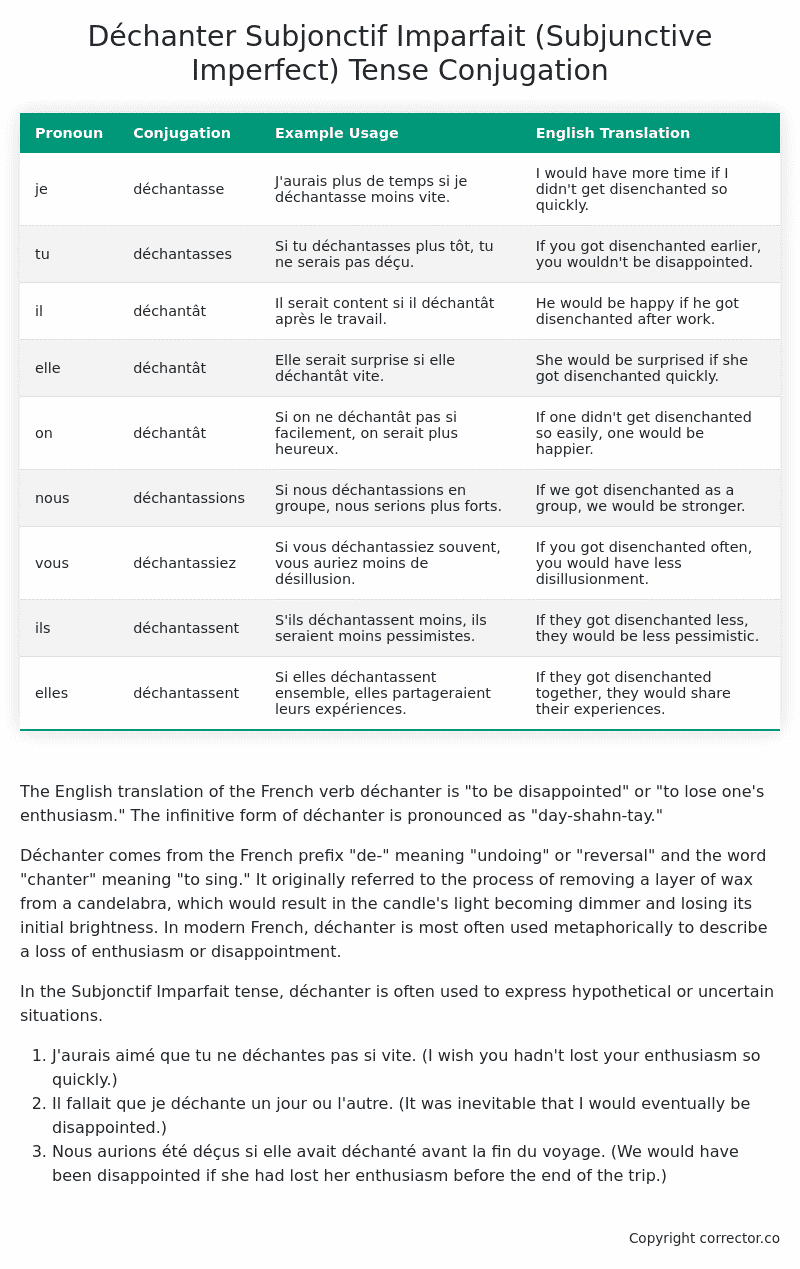Subjonctif Imparfait (Subjunctive Imperfect) Tense Conjugation of the French Verb déchanter
Introduction to the verb déchanter
The English translation of the French verb déchanter is “to be disappointed” or “to lose one’s enthusiasm.” The infinitive form of déchanter is pronounced as “day-shahn-tay.”
Déchanter comes from the French prefix “de-” meaning “undoing” or “reversal” and the word “chanter” meaning “to sing.” It originally referred to the process of removing a layer of wax from a candelabra, which would result in the candle’s light becoming dimmer and losing its initial brightness. In modern French, déchanter is most often used metaphorically to describe a loss of enthusiasm or disappointment.
In the Subjonctif Imparfait tense, déchanter is often used to express hypothetical or uncertain situations.
- J’aurais aimé que tu ne déchantes pas si vite. (I wish you hadn’t lost your enthusiasm so quickly.)
- Il fallait que je déchante un jour ou l’autre. (It was inevitable that I would eventually be disappointed.)
- Nous aurions été déçus si elle avait déchanté avant la fin du voyage. (We would have been disappointed if she had lost her enthusiasm before the end of the trip.)
Table of the Subjonctif Imparfait (Subjunctive Imperfect) Tense Conjugation of déchanter
| Pronoun | Conjugation | Example Usage | English Translation |
|---|---|---|---|
| je | déchantasse | J’aurais plus de temps si je déchantasse moins vite. | I would have more time if I didn’t get disenchanted so quickly. |
| tu | déchantasses | Si tu déchantasses plus tôt, tu ne serais pas déçu. | If you got disenchanted earlier, you wouldn’t be disappointed. |
| il | déchantât | Il serait content si il déchantât après le travail. | He would be happy if he got disenchanted after work. |
| elle | déchantât | Elle serait surprise si elle déchantât vite. | She would be surprised if she got disenchanted quickly. |
| on | déchantât | Si on ne déchantât pas si facilement, on serait plus heureux. | If one didn’t get disenchanted so easily, one would be happier. |
| nous | déchantassions | Si nous déchantassions en groupe, nous serions plus forts. | If we got disenchanted as a group, we would be stronger. |
| vous | déchantassiez | Si vous déchantassiez souvent, vous auriez moins de désillusion. | If you got disenchanted often, you would have less disillusionment. |
| ils | déchantassent | S’ils déchantassent moins, ils seraient moins pessimistes. | If they got disenchanted less, they would be less pessimistic. |
| elles | déchantassent | Si elles déchantassent ensemble, elles partageraient leurs expériences. | If they got disenchanted together, they would share their experiences. |
Other Conjugations for Déchanter.
Le Present (Present Tense) Conjugation of the French Verb déchanter
Imparfait (Imperfect) Tense Conjugation of the French Verb déchanter
Passé Simple (Simple Past) Tense Conjugation of the French Verb déchanter
Passé Composé (Present Perfect) Tense Conjugation of the French Verb déchanter
Futur Simple (Simple Future) Tense Conjugation of the French Verb déchanter
Futur Proche (Near Future) Tense Conjugation of the French Verb déchanter
Plus-que-parfait (Pluperfect) Tense Conjugation of the French Verb déchanter
Passé Antérieur (Past Anterior) Tense Conjugation of the French Verb déchanter
Futur Antérieur (Future Anterior) Tense Conjugation of the French Verb déchanter
Subjonctif Présent (Subjunctive Present) Tense Conjugation of the French Verb déchanter
Subjonctif Passé (Subjunctive Past) Tense Conjugation of the French Verb déchanter
Subjonctif Imparfait (Subjunctive Imperfect) Tense Conjugation of the French Verb déchanter (this article)
Subjonctif Plus-que-parfait (Subjunctive Pluperfect) Tense Conjugation of the French Verb déchanter
Conditionnel Présent (Conditional Present) Tense Conjugation of the French Verb déchanter
Conditionnel Passé (Conditional Past) Tense Conjugation of the French Verb déchanter
L’impératif Présent (Imperative Present) Tense Conjugation of the French Verb déchanter
L’infinitif Présent (Infinitive Present) Tense Conjugation of the French Verb déchanter
Struggling with French verbs or the language in general? Why not use our free French Grammar Checker – no registration required!
Get a FREE Download Study Sheet of this Conjugation 🔥
Simply right click the image below, click “save image” and get your free reference for the déchanter Subjonctif Imparfait tense conjugation!

Déchanter – About the French Subjonctif Imparfait (Subjunctive Imperfect) Tense
Formation
Common Everyday Usage Patterns
Interactions with Other Tenses
Subjonctif Présent
Indicatif Passé Composé
Conditional
Conditional Perfect
Summary
I hope you enjoyed this article on the verb déchanter. Still in a learning mood? Check out another TOTALLY random French verb conjugation!


